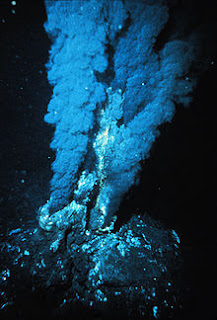 There are some fairly interesting happenings in our universe these days. For now, I'm going to take a look at our own solar system, but I definitely will return to talk about other aspects of the universe.
There are some fairly interesting happenings in our universe these days. For now, I'm going to take a look at our own solar system, but I definitely will return to talk about other aspects of the universe.Just in our solar system, there are purportedly several moons with liquid water oceans. This is surprising given we normally assume any object closer than Earth to the sun does not have water and any object further away has ice but not liquid water.
Europa is a moon of Jupiter's which has the highest likelihood of having a liquid ocean underneath its surface. Most planetary scientists believe that a layer of liquid water exists beneath Europa's surface, kept warm by tidally generated heat due to gravitational/magnetic influences from Jupiter itself. Unusual features on Europa's surface also hint at a hidden ocean.
Europa has emerged as one of the top locations in the Solar System in terms of potential habitability and possibly, hosting extraterrestrial life. Life could exist in its under-ice ocean, perhaps subsisting in an environment similar to Earth's deep-ocean hydrothermal vents or the Antarctic Lake Vostok. If life were to exist on Europa, it would not only prove that life exists beyond Earth but that life is likely to be common throughout the Universe.
Other moons of Jupiter, namely Callisto and Ganymede, as well as Neptune's largest moon, Triton, are also hypothesised to have liquid oceans for similar reasons to Europa, although there is less certainty about them.
Titan is Saturn's largest moon and the only moon in the solar system known to have clouds and a dense atmosphere. On the surface, water behaves like rock and hydrocarbons behave like liquids such as water. It has a dense atmosphere and the surface is rocky, similar to rocky planes on Earth. Titan has rivers and lakes populated by hydrocarbons. It is also thought to likely have a subterranean water ocean under the mix of ice and hydrocarbons that forms its outer crust.
Scientists believe that the atmosphere of early Earth was similar in composition to the current atmosphere on Titan, with the important exception of the lack of water vapor on Titan. Many hypotheses have developed that attempt to bridge the step from chemical to biological evolution.
Enceladus is one of the hottest places in the Solar System to look for life due to pure accessibility. This tiny moon has geyser-like jets of water bursting from the surface. There are a number of potential explanations, such as the source of the water being supplied from a liquid ocean underneath the crust, heated by Saturn's gravitional/magnetic influence. The presence of liquid water under the crust means there has to be an internal heat source. Scientists now believe it is a combination of radioactive decay and tidal heating, as tidal heating alone is not enough to explain the heat.
Sources:
Articles on "Europa, Callisto, Ganymede, Titan and Enceladus." Encyclopædia Britannica Online School Edition. Web. 17 Feb. 2011.
Briggs, Helen. "Saturn Moon May Have Hidden Ocean." BBC News - Home. 20 Mar. 2008. Web. 18 Feb. 2011.
Wikipedia:
http://en.wikipedia.org/wiki/Extraterrestrial_liquid_water
http://en.wikipedia.org/wiki/Europa_(moon)
http://en.wikipedia.org/wiki/Titan_(moon)
http://en.wikipedia.org/wiki/Enceladus_(moon)

